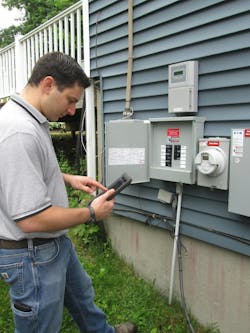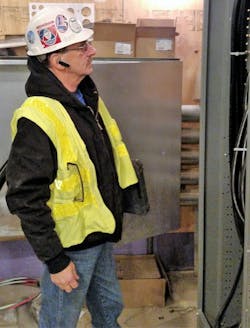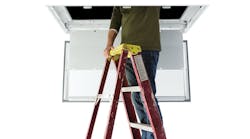I started my career sweeping floors in the basement of a university building hoping to be seen as worthy to become an electrical apprentice. In those days, there were no mandatory apprenticeship training programs. To become an apprentice — and then be placed into an electrical apprenticeship program — was an expense to the contractor that may or may not produce a licensed employee. A strong work ethic, reliability, and a willingness to learn were necessary to even be considered for this type of position. During this time as an apprentice — and eventually a licensed electrician — I heard several stories about those evil, despicable electrical inspectors. I never dreamed I would become one later in my career. This article presents some ways you as an electrical professional can enhance your working relationship with the electrical inspector.
Bribes, kickbacks, and mafia payoffs
Who remembers the movie back in the ’80s called “Back to School”? Rodney Dangerfield played a successful older businessman who decided to enroll in college with his son. During one scene in the movie, his character, Thorton Melon, decides to inform the business professor he was wrong about how to get things built. Dr. Barbay (the professor) responded, “Maybe bribes, kickbacks, and mafia payoffs are how you do business, but they are not part of the legitimate business world!”
Some people believe that to appease the electrical inspector, you need to take them to lunch, send them presents during the holiday season, take them on expensive hunting or fishing excursions, etc. Do not go down this path. Bribes and kickbacks have no place in the legitimate electrical installation and inspection world.
Some of these offerings may be innocent with no favors expected. Even at that, the public seeing this type of relationship can get the gossip mill running. Plus, other electrical professionals begin jumping to conclusions that there may be something inappropriate going on between a certain electrical contractor and the local or state inspector. Putting a bottle of the inspector’s favorite alcoholic beverage or an envelope full of money in the inspection vehicle when the inspector is conducting the inspection is a good way to be arrested and/or cause the inspector to lose their job. You may be laughing, but this has happened — and the inspector immediately called the police and his supervisors to the scene. A few dollars in bribes can cost a person their integrity and jeopardize working as an inspector in other jurisdictions.
Many states and municipalities have strict guidelines on these types of activities that could result in disciplinary actions, including termination. Contrary to what you learned as an apprentice or during your time as an electrician, bribes or kickbacks cannot exist in the electrical installation/inspection relationship.
Know what to do and do what you are supposed to do
A surefire way to build and maintain a good working relationship with an electrical inspector is simple. Know how to do your job, and understand/follow the local and state Code requirements as they pertain to your electrical work. In the end, this is what the inspector expects — a Code-compliant installation that follows state and local electrical requirements done in a workmanlike manner.
As an installer, this means listening to those who are willing to share the secrets of the electrical trade with you, going to your apprenticeship classes and learning all there is to know about the electrical industry, and testing for and receiving your electrical license upon completion of your apprenticeship training.
Many believe that once they graduate from the apprenticeship program and get their license, they never need to open that Code book again. If that is what you believe, I have news for you: Learning never stops in this trade or any other profession. Continuing education in this trade is a requirement to produce Code-compliant electrical installations. The technological advances taking place today require all electrical professionals to stay engaged in the learning process. How many folks attending an apprenticeship training program in the 1960s received electrical training on renewable energy systems? Today, these seasoned professionals are being looked upon to install or inspect these systems in a Code-compliant manner. To achieve this level of expertise, the electrical professional must attend electrical continuing education events. A training event can help fill in the gaps that might exist with your electrical training needs.
Other ways to ensure a good relationship with an inspector is to have quick access to the edition of the NEC — or other standards being enforced in the area where you’re performing work — and know those requirements. If you have a disagreement or misunderstanding with an inspector, open the standards being enforced, and seek clarification. Have the plans for the electrical project available to discuss the installation.
As an inspector, I appreciated the installers who wanted to meet with me before the start of the project and discuss any local ordinances or other requirements that might be in place that would affect their work. Examples might be local ordinances concerning burial depths that exceed what the NEC specifies for the installation — or an ordinance that does not allow a branch circuit less than 20A to be installed in a dwelling unit. It is always less frustrating and expensive to find out about these ordinances before beginning the electrical project. Electrical professionals must always remember that the NEC is a minimal standard. Being barely above illegal is one way to think of it.
Get your permits before beginning the project and have the electrical work ready for inspection when the electrical inspector arrives. Many municipalities have a lot of construction taking place. Your project is not the only one in the municipality they must inspect. Not being ready causes extra trips to the job site for the inspector. In some cases, this can result in re-inspection fees being assessed to the electrical contractor.
Above all else, make sure you have inspected the work before the inspector inspects the work. You are the first set of eyes on the project. Check your work! Make sure you have torqued the terminations that require torquing. Look for any missing receptacles or switch covers. Is the panel schedule in place? Are all the locknuts tightened on your connectors? Did you put all the screws in the panel cover when you placed it on the cabinet? Have you checked the polarity on all the receptacles in the structure to make sure they are wired correctly? Did you test your GFCI devices to make sure they function as intended? All of these above-mentioned items (and numerous others) help ensure the integrity and safety of the electrical installation.
Now you know
Most electrical professionals strive to do the best work possible. They take pride in their chosen career and are deeply concerned about electrical safety. Electrical inspectors share that same passion for safe electrical installations. They are like an umpire at a baseball game, calling balls and strikes batter after batter. They know the strike zone and are consistently using it to determine a ball from a strike.
At the end of the day, everyone wants to go home knowing they had a small part in keeping families electrically safe. As the installer, your job is to know the electrical installation requirements and to abide by them. This will ensure a good relationship with the electrical inspector. Doing so will keep you from striking out on your next electrical inspection.
Inspector Intel articles are provided by the Independent Alliance of the Electrical Industry (IAEI), www.iaei.org, a membership-driven, non-profit association headquartered in Richardson, Texas, that promotes electrical safety throughout the industry by providing education, certification of inspectors, advocacy, partnerships, and expert leadership in electrical codes and standards.





